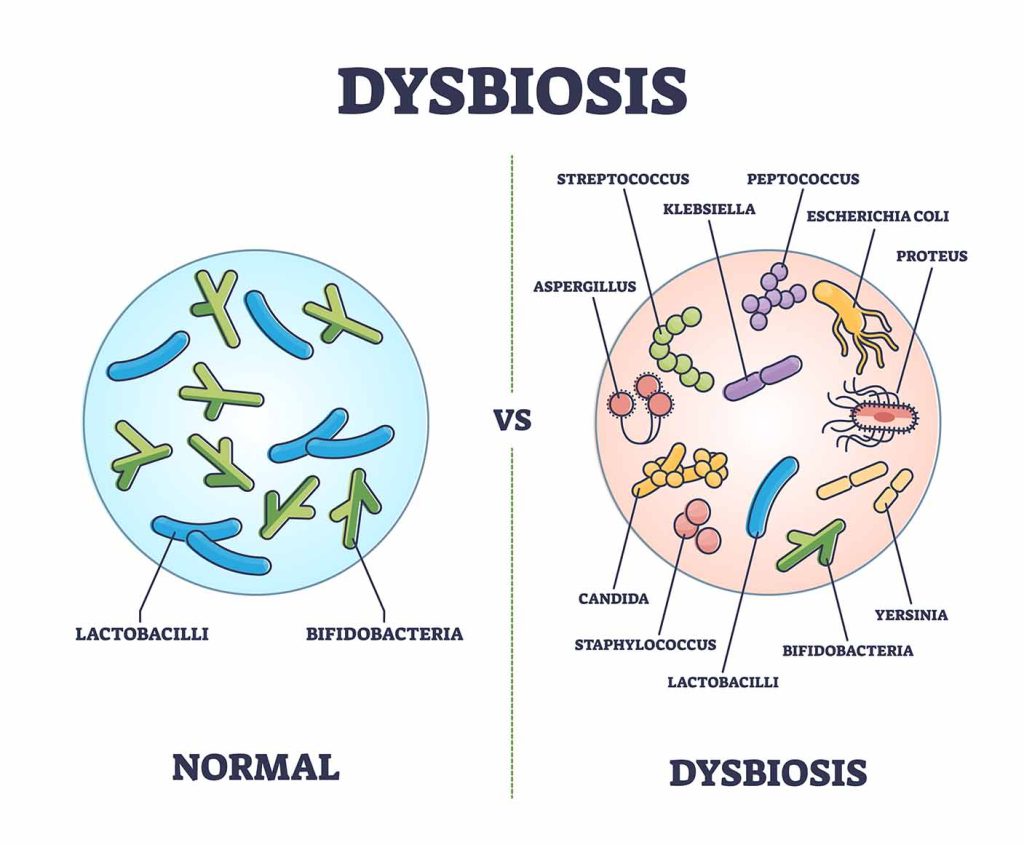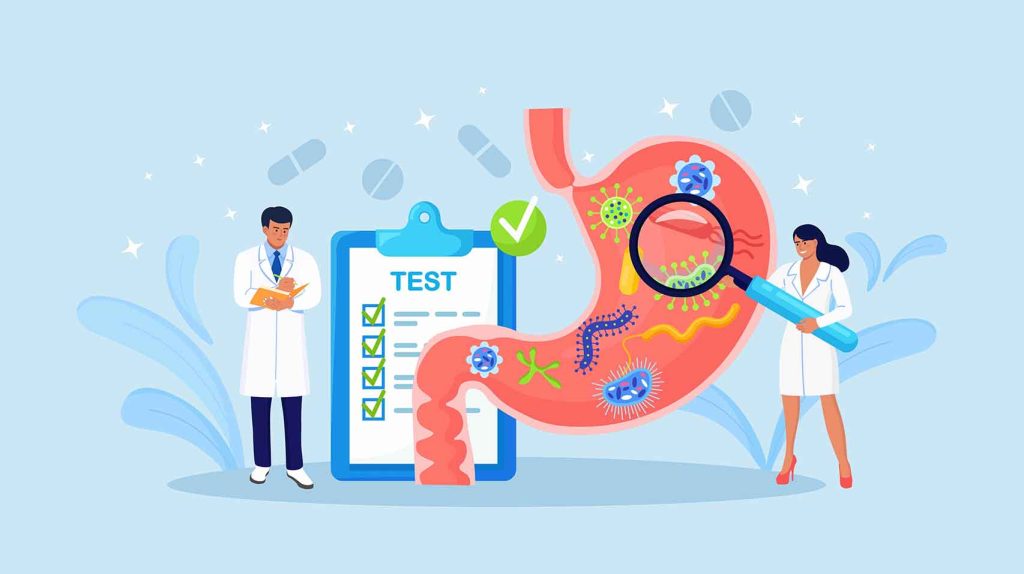A healthy gut is essential not only for optimal digestion; it plays a crucial role in the overall functioning of your body, affecting your immune system, your mood and overall wellbeing.
Chronic gut issues, ranging from bloating and acid reflux to IBS are very common and while these symptoms can be caused by several factors such as your age or dietary habits, an increasingly common yet lesser known cause is an imbalance in your gut microbiome (or gut flora) also known as gut dysbiosis.
WHAT IS THE GUT MICROBIOME?
Inside your gut, you have trillions of microorganisms collectively known as microbiota or microbes, comprising numerous species including bacteria, fungi, parasites, and viruses.
The majority of these microbes are symbiotic (benefiting both the human body and the microbiota), while a smaller number are pathogenic (contributing to disease).
When your gut is healthy, these microorganisms coexist in harmony, and your gastrointestinal (GI) tract works properly.
However, when this balance becomes disrupted, it can cause stomach problems and be a precursor to chronic illness.
– Dr. Mark Hyman, Medical Director of Cleveland Clinic’s Center for Functional Medicine
WHAT IS GUT DYSBIOSIS?
Gut dysbiosis refers to an imbalance in your microbiome, which can be triggered by infectious illnesses, specific diets, or prolonged use of antibiotics or other bacteria-destroying medications.
Dysbiosis can occur when you have:
- A lack of diversity in the types of microbes in your gut
- A deficiency of beneficial gut microbes
- A surplus of harmful bacteria
When the levels of the different microbes in your gut are not right, your gut is more vulnerable and you have an increased risk of developing chronic diseases or conditions such as:
- Allergies
- Autoimmune conditions
- Inflammatory bowel disease (IBD) or irritable bowel syndrome (IBS)
- Cancer
- Candida
- Cardiovascular problems
- Colitis
- Diabetes
- Obesity
- Polycystic ovarian syndrome
- Skin conditions, such as eczema
Working with your nutritionist or practitioner can help identify the root cause of your gut issues and determine if dysbiosis is a contributing factor.

WHAT ARE THE SYMPTOMS OF GUT DYSBIOSIS?
Everybody experiences digestive complaints from time to time. Usually these pass after a short while, however, when symptoms persist (or become chronic), this can be a sign of gut dysbiosis and should be addressed as soon as possible to prevent the condition worsening or developing into a chronic illness.
The most apparent symptoms of gut dysbiosis include:
- Abdominal pain/cramps
- Acid reflux
- Bloating, burping
- Bowel movement changes: constipation/diarrhoea or both
- Bad breath (halitosis)
- Fatty stools (steatorrhea)
- Flatulence/gas
- Food intolerance/sensitivity
- Heartburn/GERD
- Nausea and vomiting
- Nutrient malabsorption
- Undigested food, blood, or mucus in stool

HOW TO TEST FOR GUT DYSBIOSIS
Gut complaints are very common, however many people normalise feeling unwell rather than seeking help. In fact, 43% of people in the UK experience digestive problems, but only 59% of them visit a health practitioner to discuss them.
With the help of a practitioner, diagnosing dysbiosis or other gut health issues is very easy with functional lab tests. These non-invasive at-home tests provide detailed insight into the state of your gut microbiome, helping identify imbalances or potential illness, and informing treatment plans.
COMPREHENSIVE MICROBIOME STOOL TEST
This non-invasive test can be administered easily by yourself at home and provides invaluable diagnostic markers screening for:
- Gastrointestinal pathogenic infections
- Dysbiotic patterns within the microbiome
- Maldigestion/absorption
- Intestinal inflammation
- Immunological dysfunction
- Imbalances in intestinal metabolic function
SIBO BREATH TEST
This simple at-home test diagnoses small intestinal bacterial overgrowth (SIBO) known to cause digestive symptoms measureing gaseous metabolic products of bacterial fermentation within the small intestine.
Overproduction of hydrogen, methane, and/or hydrogen sulfide gases are indicative of SIBO subtypes in the gastrointestinal tract.
FOOD ALLERGY TEST
While this test does not directly identify dysbiosis, it can significantly contribute to a comprehensive analysis of your gut health, offering valuable insights to support therapy from a functional medicine perspective.
There are various tests to assess for adverse food reactions that measure your IgE antibodies against specific food proteins to help us identify which food are the cause of allergies, whereas panels that measureIgG and/or IgA antibodies can help to identify food sensitivities.
The 200+ Food Panel is a comprehensive food sensitivity test that assesses IgG antibody reactivity across a broad range of culturally-diverse foods. It’s easy to do at home as it only requires a blood spot.

BOOK A FREE DISCOVERY CALL
Discuss your health concerns with one of our expert practitioners via phone or video call to find out how we can help you heal with functional medicine.
FUNCTIONAL MEDICINE TREATMENT FOR GUT DYSBIOSIS
Once you have identified gut dysbiosis, your functional medicine practitioner can design a personalised treatment plan to restore balance within your gut microbiome.
Making the right food and lifestyle choices is the first step for gut healing, and an excellent way to promote digestive health and prevent symptoms.
NUTRITION
Your diet determines the composition of microbiota in your colon (large intestine) which in turn greatly influences your gut microbiota and overall gut health.
One of the most impactful ways to take care of your gut microbiome is to follow an anti-inflammatory diet, plant-based diet rich in fibre. Fruits and vegetables provide essential fibre for nourishing beneficial bacteria and maintaining gut health.
This diet also promotes an abundance of short-chain fatty acids (SCFAs), crucial for health, disease prevention, and positive effects on gut health and metabolism.
A balanced plant-based diet fosters a healthy microbiome, suppressing pathogens, improving intestinal barrier function, and enhancing immune tolerance.
In contrast, the Western diet, rich in red meat and processed foods with excess sugar, fats, and salt, contributes to “leaky gut” or Intestinal Permeability. Additionally, processed foods may lose their original nutrients during manufacturing.
Remember, everyone is unique and reacts differently to foods. The diet that works for a friend of yours may not be optimal for you.
A functional medicine practitioner takes into account your health history, symptoms and lab results to design the best diet plan and therapeutic approach for you to restore balance in your gut.
LIFESTYLE
To support optimal gut health, simple lifestyle changes can have a significant impact.
Adopting habits such as consuming whole foods, maintaining good dental hygiene, staying hydrated, prioritising sleep, engaging in regular exercise, and replacing personal care and cleaning products with non-toxic alternatives are all vital for a healthy gut.
Managing stress effectively is also crucial in rebalancing the gut microbiome. Engaging in activities like yoga, exercise, and meditation can effectively reduce stress and promote healing of both the mind and gut.
SUPPLEMENTS
Seeking the expertise of a practitioner, as well as advanced functional stool testing, helps personalise supplement recommendations by assessing the actual microbial composition in your gut.
- Prebiotics and probiotics – aid in increasing beneficial gut microbes
- Zinc carnosine – an effective supplement for repairing and strengthening the gut lining while supporting a healthy immune response
- Ginger – has anti-inflammatory properties and a positive impact on gut microbial diversity. It acts as a natural prokinetic, enhancing stomach emptying, and is commonly used in cases of SIBO (small intestinal bacterial overgrowth)
- Vitamin D – deficiency is increasingly prevalent and has been associated with dysbiosis. Its benefits have been studied in both healthy individuals and those with chronic illnesses, showing improvement in dysbiosis across various populations
It’s important to note that supplements may not be appropriate for everyone, for example individuals taking certain medications. Additionally, not everyone initially tolerates probiotics, as they can lead to bloating and other gastrointestinal symptoms and it may take some time to introduce into your diet.
YOUR HEALTH. YOUR CHOICE.
Aside from the uncomfortable symptoms dysbiosis produces, it is also a precursor and contributing factor to much more serious health conditions that can greatly affect your quality of life.
At Nutrition Diets, we specialise in identifying and correcting imbalances in our clients’ gut health. We offer thorough clinical assessment via easy and convenient online consultations and specialise in personalised nutritional therapy, lifestyle solutions and comprehensive Functional testing.
Getting started is simple and free. Take action to optimise your gut health and reduce your risk of dysbiosis and chronic illness.
